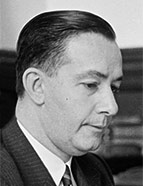

Pedro Calmon, a Brazilian historian, was born on 23 December 1902 in Amargosa, Bahia, and passed away in Rio de Janeiro on 17 June 1985. Descended from aristocratic families from Bahia and Minas Gerais, he was the son of Pedro Calmon Freire de Bittencout and Maria Romana Moniz de Aragão Calmon de Bittencourt. He entered the Law Faculty of Bahia in 1920. Two years later, he moved to Rio de Janeiro, then the capital of the Republic, where he continued his studies and graduated from the former Faculdade Nacional de Direito [National Law School]. At the same time, he began working as a private secretary to his uncle and baptismal godfather, Miguel Calmon, the Minister of Agriculture, during the administration of President Artur Bernardes (1922-1926). In 1925, he was appointed curator at the Museu Histórico Nacional [National Historical Museum], where he later created and was awarded the chair of History of Brazilian Civilisation on the museology course. He also taught this subject at the short-lived Universidade do Distrito Federal [University of the Federal District], founded by Anísio Teixeira. Pedro Calmon also pursued a political career, being elected to both the state and federal legislatures in Bahia and later serving as Minister of Education in the government of Eurico Gaspar Dutra (1950-1951).
As a teacher, he divided his time between teaching Brazilian history and public law. In 1934, he sat the exam to become a lecturer in public law at the Faculdade Nacional de Direito , and five years later, after passing a public examination, he was appointed professor in the same field. In 1955, again through a public competition, he was awarded the chair of Brazilian History at Colégio Pedro II, with his thesis O segredo das minas de prata: novos aspectos da conquista [The Secret of the Silver Mines: New Aspects of the Conquest]. He also taught at the Pontifícia Universidade Católica do Rio de Janeiro [Pontifical Catholic University of Rio de Janeiro] and at the Faculdade de Filosofia [Faculty of Philosophy] at Universidade Santa Úrsula [Santa Úrsula University]. Simultaneously, he held significant administrative positions within academia: he was director of the Faculdade Nacional de Direito (1938-1948) and later appointed rector of the former Universidade do Brasil [University of Brazil], now the Universidade Federal do Rio de Janeiro [Federal University of Rio de Janeiro] (UFRJ), a role he held for eighteen years (1948-1966).
This work is financed by national funds through FCT - Foundation for Science and Technology, I.P, in the scope of the projects UIDB/04311/2020 and UIDP/04311/2020.
